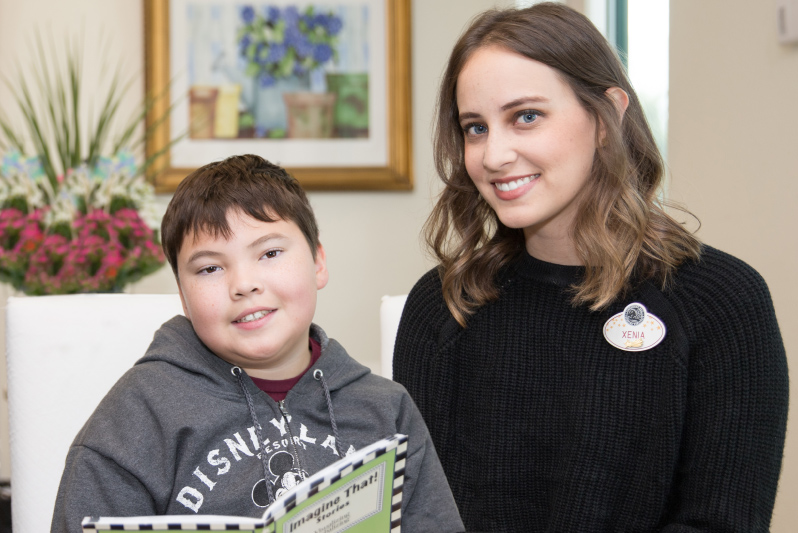
Understanding Aphantasia
Aphantasia is a condition in which an individual cannot form or has difficulty forming visual images in their mind. It is thought to affect an estimated 2-5% of the population. Though not widely recognized, understanding this phenomenon is helpful for educators, parents, and individuals. Termed by Professor Adam Zeman in 2015, aphantasia seems to affect one’s capacity to imagine or recall details about people, places, objects, or events.
Aphantasia can range from the complete absence of visual imagery to faint or fragmented images. Some individuals report that they cannot create any mental images, while others may have limited or blurry ones. Some report that they experience variations in visualizing specific types of images, such as faces, landscapes, or objects, underscoring the complexity of the condition and its potential impact on learning and daily life.
These difficulties are not related to vision impairment but reflect differences in how the brain processes information. Recent studies suggest aphantasia occurs in about 4% of the general population, and due to its subjective nature, the number of individuals who would meet the criteria is still being determined. (Dance, Ipser, Simner, 2022)
Although the exact cause of aphantasia is not fully understood, researchers have identified several potential triggers and contributing factors. One possible cause is the lack of activation or connectivity in the brain’s visual processing areas. Studies have shown that individuals with aphantasia exhibit reduced activity in the visual cortex, suggesting a neurological basis for the condition. People with this condition often struggle to recall or recognize visual details from past experiences, indicating a connection between visual imagery and memory retrieval.(Montabes de la Cruz, Belén M. et al. 2024)
Additionally, individuals’ ability to generate mental imagery varies and a distinctive relationship exists between image generation and cognitive processes such as memory and language comprehension. Indeed, the correspondence between imaginal skills and learning in general is pervasive.
At Lindamood-Bell, our nearly forty years of clinical research and experience have shown that many students struggle to create holistic or gestalt images due to weaknesses in the brain’s sensory systems.
Lindamood-Bell refers to this as concept imagery, the ability to create an imaged gestalt from oral and written language. It has been found that this ability is crucial for oral and written language comprehension, including understanding abstract and complex ideas. While individuals may have differing abilities, the imaginal processes needed for reading comprehension are not different. Sensory-cognitive functions such as creating mental representations can be developed, changing an individual’s ability to comprehend oral and written language.
Individuals with aphantasia can benefit from explicit instruction on how to image. The Visualizing and Verbalizing® (V/V®) program develops concept imagery—the ability to create an imagined or imaged gestalt from language—as a basis for comprehension and higher-order thinking. The development of concept imagery improves reading and listening comprehension, memory, oral vocabulary, critical thinking, and writing.
Lindamood-Bell is contributing to the growing body of research regarding aphantasia.
At The Eye’s Mind: Visual Imagination, Neuroscience and the Humanities Conference in the United Kingdom, Lindamood-Bell co-founder and author of Visualizing and Verbalizing for Language Comprehension and Thinking, Nanci Bell, and Lindamood-Bell’s Research and Development Director, Paul Worthington, contributed to the conference dialogue on the role of imagery in education. Their presentation, Visual Imagery: The Nonverbal Code for Language and Cognition, underscored the critical link between visual imagery and cognitive functions, emphasizing how behavioral neuroscience has confirmed the foundational role of visual imagery in oral and written language comprehension. Recent studies have also documented how improving visual imagery can address deficits like aphantasia, correlating these findings with language comprehension improvements.
Grounded in Dual Coding Theory (DCT), which asserts that human cognition relies on both verbal and nonverbal processing, the session highlighted how systematic instructional approaches can activate the nonverbal imagery code, facilitating language skills in learners of all ages. Drawing on over 30 years of instructional experience and work with more than 35,000 children across the U.S., the U.K., and Australia, five key insights into the imagery-language connection have emerged:
- Significant individual differences exist in the ability to generate visual imagery.
- A strong correlation exists between visual imagination and language comprehension.
- Individuals can learn to consciously create visual images, leading to significant gains in reading and language comprehension.
- Linking the sensory input of imagery to language results in significant neurological changes and reading improvements in children with dyslexia
- Stimulating the imagery-language connection in children with autism spectrum disorder improves language comprehension, accompanied by fundamental changes in the connectivity of the brain regions involved in reading comprehension.
Diagnosis and Support for Aphantasia

Recognizing the signs and symptoms is the first step toward receiving appropriate support for aphantasia. Common indicators include an inability to visualize people, places, or objects, difficulty recalling visual details, and a general lack of concept imagery. At Lindamood-Bell, we understand that individuals of all ages may experience challenges related to weak concept imagery, which can result in difficulties with:
- Reading comprehension
- Listening comprehension
- Critical thinking and problem-solving
- Following directions
- Memory
- Oral language expression
- Written language expression
- Grasping humor
- Interpreting social situations
- Understanding cause and effect
Lindamood-Bell’s evidence-based instruction helps individuals develop their mental imagery abilities. The Visualizing and Verbalizing (V/V) program strengthens the sensory-cognitive skill of concept imagery. Our targeted instruction provides the foundation students need for academics and daily life.
Proven Results for Improving Comprehension

At Lindamood-Bell, students receive individualized instruction using one or more of our founders’ evidence-based programs. The Visualizing and Verbalizing (V/V) program develops concept imagery—the ability to create an imaged gestalt from language—as a basis for comprehension and higher-order thinking. The development of concept imagery improves reading and listening comprehension, memory, oral vocabulary, critical thinking, and writing. Visualizing and Verbalizing® (V/V®) addresses the needs of students diagnosed with aphantasia.
The following shows the pre- and post-instruction performance of all students who received Visualizing and Verbalizing instruction at Lindamood-Bell between 2008 and 2023. These students experienced large (statistically significant) improvements in all comprehension subtests after receiving Visualizing and Verbalizing instruction.
Results of Students Who Received Comprehension Instruction

Lindamood-Bell Instruction Implemented: Visualizing and Verbalizing
On average, students who received Visualizing and Verbalizing instruction achieved significant improvements in areas associated with language comprehension. Our Comprehension-Only student population represents about 24% of our total Learning Center population. They made large (statistically significant) standard score changes on two of the three measures. Additionally, the 22-point percentile increase in Written Language Comprehension moves these students from a deficit condition to well within the normal range (25th—75th percentile).
Year: Jan. 2008 – Dec. 2023
Number of Students: 6,462
Average Age: 12.4
Average Hours of Instruction: 103.8
Help for Aphantasia at Lindamood-Bell

Lindamood-Bell provides individualized, evidence-based instruction to assist students facing reading, comprehension, and math challenges, including those diagnosed with aphantasia. Whether your student has been diagnosed with aphantasia or is just struggling with comprehension, we can help.
Our instruction begins with a comprehensive Learning Ability Evaluation. This assessment identifies underlying learning challenges and helps us understand your student’s unique needs. Based on the evaluation results, we develop a personalized instruction plan tailored to address the root causes of their learning difficulties. Take the first step toward transforming your student’s future by scheduling a Learning Ability Evaluation today.
Student Story: Overcoming Reading and Comprehension Difficulties
Watch a family’s inspiring story of how Lindamood-Bell transformed their student’s learning. Through our programs, the student developed stronger mental imagery skills and significantly improved comprehension.
We believe every individual has the potential to thrive, and we are dedicated to helping students reach their full learning potential, including those who have a diagnosis of aphantasia. Contact us today to get started.
Get in touch or call 800-300-1818 to learn more.
References:
The prevalence of aphantasia (imagery weakness) in the general population,
Dance, C.J. et. al.
Consciousness and Cognition, Volume 97, 2022
Decoding sound content in the early visual cortex of aphantasic participants
Montabes de la Cruz, Belén M. et al.
Current Biology, Volume 34, Issue 21, 5083 – 5089.e3 2024






